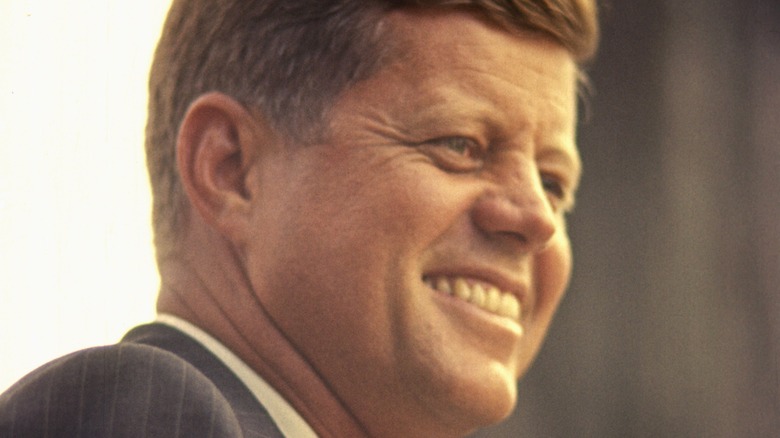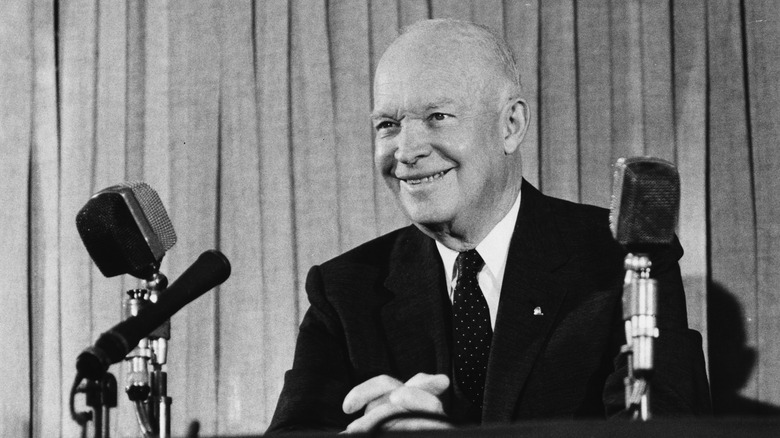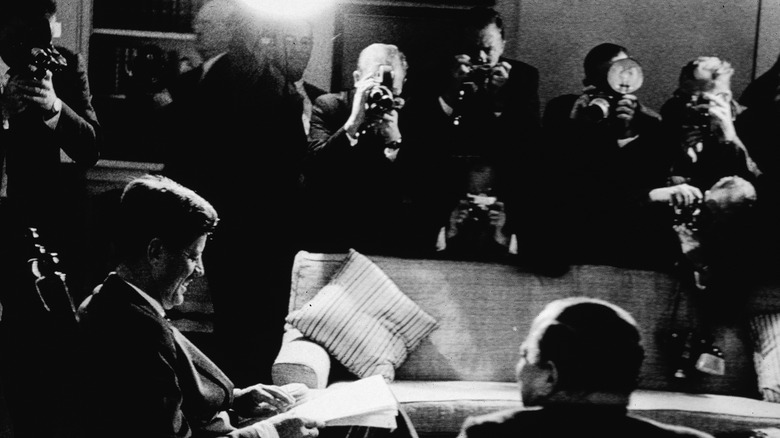JFK's Unexpected Source Of Advice During The Cuban Missile Crisis
Few moments in American history have been as tense as the Cuban Missile Crisis. For nearly two weeks in October 1962, the John F. Kennedy administration, the Soviet Union, and — when it was finally announced to the public — the entire world, held its collective breath as the world seemed close to the brink of a full-on nuclear war.
According to the John F. Kennedy Library, a U-2 spy plane flying miles above Cuba spotted and then managed to photograph missile sites being constructed on the island. Given that Cuba sits less than 100 miles from the United States at its closest point, per Reference, this was a major concern. Kennedy initially aimed to keep this discovery secret from everyone including the Soviets, Cubans, and the public. Kennedy held meetings in secret for about a week regarding what the United States' next move should be. In addition to members of the White House staff, Kennedy managed to get some insight from one of the few people in history to have also sat behind the Oval Office's Resolute Desk: former president Dwight Eisenhower.
John F. Kennedy's phone call to Dwight Eisenhower
John F. Kennedy defeated Dwight Eisenhower's vice president, Richard Nixon, in the 1960 presidential election, but at such a desperate time it wouldn't have been hard to put aside partisan politics in favor of the nation's — and the world's — best interests. According to the University of Virginia's Miller Center, former president Eisenhower had been briefed twice on what was happening in Cuba once on October 17 and again several days later on October 21, at which time he was informed of Kennedy's plan to set up a blockade around Cuba. Eisenhower had received this briefing from CIA director John McCone, who reported back to Kennedy that Eisenhower — a highly decorated and respected general — approved of how Kennedy was handling the situation.
In the recording, Kennedy and Eisenhower sound noticeably relaxed especially given the circumstance — they're even chuckling at times. Kennedy even asked Eisenhower about his thoughts on whether or not he thought the Soviets would start a nuclear war if the United States decided to invade Cuba. "Oh, I don't believe that they will," Eisenhower responded matter of factly.
Another interesting moment in the call is when Kennedy mentioned his concern that the Soviets may try to take the western half of Berlin. "Well, they might. But I, personally, I just don't quite go along, you know, with that thinking, Mr. President. My idea is this: The damn Soviets will do whatever they want, what they figure is good for them."
The end of the Cuban Missile Crisis
Before it came to a close, the Cuban Missile Crisis reached a crescendo when another U-2 spy plane was shot down by a Soviet anti-aircraft missile. This led to the only casualty directly tied to the Cuban Missile Crisis, and it nearly led to all-out war. John F. Kennedy's advisors were incensed and argued that President Kennedy would be justified in retaliating because the Soviets had fired the opening salvo. According to History, Kennedy was unconvinced that the order to shoot down the spy plane had come from Soviet Prime Minister Nikita Khrushchev.
Kennedy's gut feeling turned out to be correct, as the missile strike had been ordered by Soviet Lieutenant General Stepan Grechko. The strike, which resulted in the death of pilot Rudolf Anderson Jr., showed both Kennedy and Khrushchev the ramifications and potential loss of life that would result if the situation escalated further. That escalation was what Kennedy feared. "It isn't the first step that concerns me, but both sides escalating to the fourth or fifth step and we don't go to the sixth because there is no one around to do so," he reportedly told his advisors at the time.


